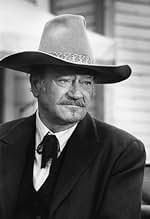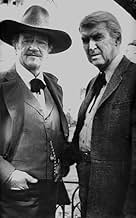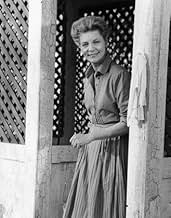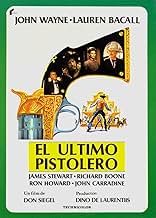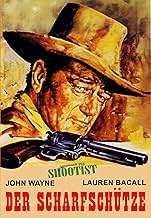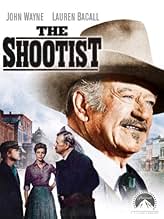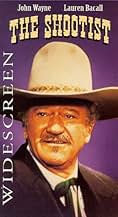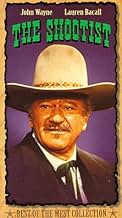A dying gunfighter spends his last days looking for a way to die with a minimum of pain and a maximum of dignity.A dying gunfighter spends his last days looking for a way to die with a minimum of pain and a maximum of dignity.A dying gunfighter spends his last days looking for a way to die with a minimum of pain and a maximum of dignity.
- Director
- Writers
- Stars
- Nominated for 1 Oscar
- 1 win & 5 nominations total
- Girl on Streetcar
- (as Melody Thomas)
- Man Outside Metropole
- (uncredited)
- Director
- Writers
- All cast & crew
- Production, box office & more at IMDbPro
Featured reviews
Wayne portrays J. B. Books, the most famous lawman in the West who killed thirty men in his life... Books arrives to Carson City in 1901, the day Queen Victoria died in England...
Wayne went first to get a medical diagnosis known to everyone as cancer.
Dr. Hostetler (James Stewart) was too practical... He gives Book the most potent pain-killer he gets, and tells him where to stay in town...
The film is build to one and only purpose: To let Wayne die with dignity, without physical pain, at the Metropole gambling saloon, in a showdown with three heavies: Richard Boone, a bad-tempered ugly man who wants to avenge his brother's death; Hugh O'Brien, a skilled dealer and a presumptuous gunfighter; and Bill McKinney, an unpleasant provoking gunman just released from prison...
Ron Howard plays the crude graceless adolescent, the first to meet Wayne in the street: 'The old man ain't worth a bullet,' he says, 'he looks all tuckered out.' In this particular scene, it comes to my mind the insolent young punk, Skip Homeir, who tries to prove something when he confronts Gregory Peck in the psychological Western "The Gunfighter."
Wayne seems surprised by the visit of Serepta (Sheree North), an unscrupulous aging lady-love who tries to take advantage of him, asking him to marry her simply for a marriage certificate, and a famous name... She surely was not the woman of quality, the good prostitute (Claire Trevor) in "Stagecoach."
John Carradine, who plays the mysterious passenger, also in "Stagecoach," makes a brief appearance as the undertaker...
Tying to overcome his bloody past, John Wayne shows, in the film, the other side of the 'Shootist,' his human side... We find him pleasantly amusing when he reveals to Stewart the truth about the red fancy cushion he carries in the film...
Filmed in Carson City, Nevada, and with a fine supporting cast, this untraditional motion picture is a lyrical elegiac Western of the highest quality, a moving tribute to a legendary actor and a tender farewell to a Super Star...
At the period in which this film is set, gunslingers or `shootists' were soon to go the way of the horse and buggy. The queen (Victoria) had just died. Electricity, modern plumbing, modern commerce, modern transportation, and creature comforts were beginning to take over (check out the electric ceiling fans and mosaic tiles in the saloon!). Forward to real life'. It is 1976. One by one, the mythic legends created by dime novels and Hollywood movies are being demystified. From Billy The Kid to Buffalo Bill, to Bonnie and Clyde, audiences have been shown for over decade how legends have always been manufactured. There are some who may see this demystification as a negative thing, but when people start adoring soldiers, celebrities and gangsters as something more than human, it's time to set the record straight. That's what all the best films of the seventies did. They broke the myths but they did not break the spirit, for what they did was let US, not the supermen on the screen, become the heroes. We could be afraid, old, young, ill, or weak, and we could feel pain and humiliation. In the process of confronting our limitations we become stronger. To be a stronger human being is to become civilized. Like this film shows us, we CAN reject the gun and join civilization. This film is John Wayne's gift to us. He is enabling us to grow up, to look at the past with respect, but to face the future with responsibility. His John Books is worth more to us than all his superheroes put together. We're all gonna die, we're all afraid, and pain is very, very real. It is in the process of surrendering to this fact with dignity and humility that we in a sense become immortal. To try to live as a superman is to die a fool. Only cowards (and very dangerous people) embrace myths over reality. That dainty red pillow has made The Duke sit very tall in his saddle indeed!
But even when viewed without that knowledge, The Shootist is a thoughtful, sad and very well acted film. Although I've seen only a handful of Wayne's 200-plus movies, it's hard for me to believe that he ever turned in a better performance than he did here. His portrayal of a terminally ill man wanting to end his life on his own terms is moving and totally convincing. The supporting cast is also outstanding, and Wayne has several great scenes with actors like Jimmy Stewart, Lauren Bacall, Ron Howard and even Scatman Crothers. I found Harry Morgan, whom I usually like, to be a bit cartoonish as the marshall who was anxious to see Wayne's character die as quickly as possible, but that's a minor quibble.
Since the movie takes place in 1901, there are naturally references to the end of the old west and the coming of a new age, and how the time of gunfighters like Wayne's character have come to an end. Again, it is difficult to view these scenes without thinking of the twilight of Wayne's career and the declining popularity of western films, just as you can't help but connect the plight of his character in this film with his own death from cancer a few years later.
It's hard to imagine that any other significant actor ever made a more appropriate and moving farewell film. You don't need to be a fan of westerns, or even a fan of John Wayne, to appreciate The Shootist.
The film is a particularly appropriate one for Wayne's last picture. The protagonist he plays is a man at the top of his profession with nowhere left to go. Any opponent who has ever fought him has died at the end of Books' barrel; but now, he is fighting an enemy he cannot hope to face and beat like a man. Whatever he does to fight the cancer, it will just take him anyway. And so, Books searches for a way to go down fighting and to die with dignity, not dying a slow crippling death in his bed.
Books is a character that has many faults. He is a man who has killed thirty men and shows no remorse. As he puts it himself, `I never killed a man who didn't deserve it'. However, despite all his faults, he shows himself to a gentleman of the old school. He is like a knight in armour transplanted to the last days of the Wild West, trying hard to keep all the old values of a dignity and honour alive. He is a man who lives by a code which he believes in, and which he applies to others: `I won't be wronged, I won't be insulted, and I won't be laid a hand on. I don't do these things to other people, and I require the same from them.'
There is no real villain in this film. Books, with all his flaws, is not a bad man. The real villains here are the ordinary people who are all around him in the city, willing to exploit him and use his fame, illness and even his death to further their own wealth. The whole town, from reporters to undertakers, are only too eager to exploit him, with only a few good people being an exception to this tragic rule.
There is no mistaking that this is the Duke's final picture, and not anybody else's film. It is his persona and his charisma that carries and controls the film. The character of Books a rough, tough, but by no means bad, man is very much similar to that of Wayne's own and this film is essentially a vehicle allowing him to have a dramatic swansong befitting a star of his magnitude.
That isn't to say, however, that the others involved with this don't pull their weight. Lauren Bacall delivers well up to her usual standard of acting, presenting a character both strong-spirited and tenderly gentle at once, something which she does extremely well. Ron Howard also acquits himself admirably as her son, turning in a performance which has the same strength and heart as that of his screen-mother Bacall. James Stewart turns in a powerful cameo, adding to the overall poignancy of the whole affair, and Harry Morgan turns in a repellent performance as the contemptible Marshal Thibado. Dirty Harry director Don Seigel directs with skill and ensures that the film remains poignant, but never sentimental. For a western, this film does not have a great deal of action, but such is the quality of acting, direction and scriptwriting, that this doesn't really matter. When the violence does erupt, however, it is occasionally graphic but always exciting. The film's climactic gunfight is a particular highlight and is one of the Duke's best shoot-outs.
This is a powerful, entertaining and enjoyable film, regardless; however, it is further ennobled by it being the Duke's final performance. There is something curiously heart-warming about the whole affair, not least the fact that he is enabled to go out in such great style. This is a must for fans of the western genre, for fans of the Duke, or for anyone who just wants to see a well made, poignant film. Highly recommended. [8]
Did you know
- TriviaJames Stewart agreed to play a cameo role in the film only because John Wayne had specifically requested him. His brief screen time proved to be rather difficult. The bad acoustics of the huge, hollow sound stages worsened his hearing difficulties, and he stayed by himself most of the time. He and Wayne muffed their lines so often in the main scene between them that director Don Siegel accused them of not trying hard enough. Wayne's reply was a variation on an old John Ford line, advising the director, "If you'd like the scene done better, you'd better get a couple of better actors." Later on, the star told friends that Stewart had known his lines, but hadn't been able to hear his cues, and that in turn had caused his own fumbling.
- GoofsBooks' hair (John Wayne's toupee) goes from being parted on his left to his right then back to his left after he tells Marshal Thibido he's a dying man when they first talk in Books' room.
- Quotes
Gillom Rogers: [first lines, voiceover] His name was J.B. Books, and he had a matching pair of 45's with antique ivory grips that were something to behold. He wasn't an outlaw. The fact is for a while he was a lawman. Long before I met Mr. Books, he was a famous man. I guess his fame was why somebody or other was always after him. The wild country had taught him to survive. He lived his life and herded by himself. He had a credo that went:
John Bernard Books: I won't be wronged, I won't be insulted, and I won't be laid a hand on. I don't do these things to other people, and I require the same from them.
- ConnectionsFeatured in Sneak Previews: The Top Ten Films of 1976 (1977)
- SoundtracksWillow, Tit Willow
Music by Arthur Sullivan
Lyrics by W.S. Gilbert
Performed by John Wayne & Lauren Bacall
Details
Box office
- Gross US & Canada
- $8,091,910
- Gross worldwide
- $8,091,910
- Runtime
- 1h 40m(100 min)
- Color
- Sound mix
- Aspect ratio
- 1.85 : 1


